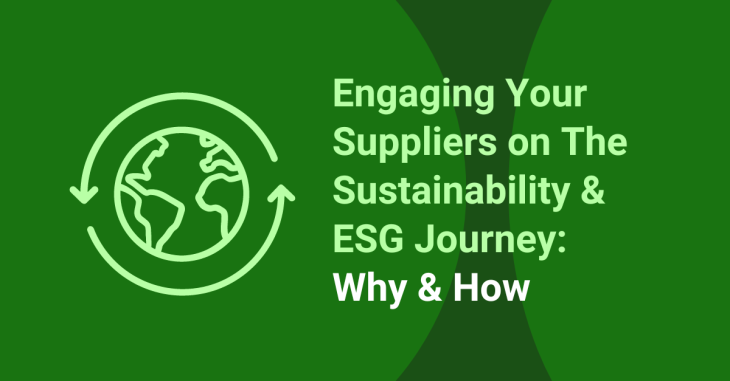Engaging your Suppliers on the Sustainability and ESG Journey – Why and How

Supplier engagement is critically important to any successful corporate sustainability program. As companies everywhere work to strengthen their Environmental, Social, and Governance (ESG) strategies, it has become clear that success is not possible without supplier collaboration. We will uncover the main reasons why supplier involvement matters and share practical ways to encourage good partnerships in sustainability efforts.
Why Supplier Engagement Matters:
Supply Chain Influence: The complex network of supply chains holds a significant part of a company’s environmental and social impact. Research shows that emissions from a company’s supply chain are much greater than those from its own operations, often by a large margin. To make real progress in sustainability, it’s crucial for companies to work together with suppliers to reduce emissions, save water, cut waste, and improve social and governance practices.
Managing Reputation: Suppliers’ practices can significantly impact a company’s reputation. To safeguard against reputation risks, companies must enhance their ESG performance by fostering transparency and implementing rigorous monitoring mechanisms throughout their supply chains. An illustrative case is the fashion giant H&M, which faced severe backlash and damage to its reputation when allegations emerged regarding its suppliers’ exploitative labor practices. As a result, H&M experienced a decline in stock value and strained partnerships.
Meeting Regulations: Laws are evolving to encompass the wider ramifications of business operations, particularly concerning supply chains. For instance, the UK Modern Slavery Act mandates that businesses operating in the UK must address modern slavery risks within their supply chains. By collaborating with suppliers, companies can ensure adherence to these regulations, mitigating the potential for legal repercussions and financial liabilities.
Innovation and Staying Ahead: When companies team up with suppliers, it sparks new ideas and helps them stand out from the competition. By working together, they can co-create products that are better for the environment. Look at Nike, for instance. They worked closely with their supply base to introduce Nike Flyknit, a special material made from recycled materials. This collaboration not only reduces waste but also makes Nike a leader in eco-friendly sports gear.
Meeting Stakeholder Expectations: Following ESG principles not only builds trust with stakeholders but also makes a company’s operations more authentic and transparent. Through engagement with suppliers and thorough impact reporting, companies can show their commitment to sustainability, meeting stakeholder expectations and establishing themselves as responsible corporate citizens.

How to Engage Suppliers Effectively:
At Rhythm Innovations, we guide you to implement these four strategies when fostering relationships with suppliers:
Establish Clear Guidelines: Ensure that suppliers understand the company’s sustainability expectations clearly by outlining specific goals and timelines. It’s crucial to express the company’s commitment to sustainability authentically and explain how supplier actions impact these objectives.
Track and Evaluate: Continuously assess supplier performance in meeting sustainability targets, offering personalized feedback and assistance to support ongoing improvement.
Collaborate and Offer Assistance: Foster a culture of collaboration by providing resources, training, and incentives to help suppliers enhance their sustainability efforts. Engage all stakeholders in addressing sustainability challenges collectively.
Acknowledge and Incentivize: Recognize and reward suppliers who excel in sustainability, whether through public acknowledgment or by providing them with preferential treatment in procurement decisions.
How Rhythm Can Help
Rhythm Innovations stands ready to assist companies in engaging their suppliers for sustainability and ESG initiatives. By implementing strategies such as establishing clear guidelines, tracking and evaluating supplier performance, fostering collaboration, and offering incentives, we ensure that companies can effectively integrate sustainability practices throughout their supply chains.


